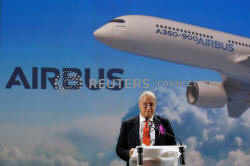EU fails to block U.S. tariffs in new WTO aircraft
ruling: sources
 Send a link to a friend
Send a link to a friend
 [December 02, 2019] By
Tim Hepher and Philip Blenkinsop [December 02, 2019] By
Tim Hepher and Philip Blenkinsop
PARIS/BRUSSELS (Reuters) - The World Trade
Organization has found the EU has failed to withdraw all subsidies to
planemaker Airbus, <AIR.PA> three people familiar with the matter said,
a decision likely to permit the United States to maintain tariffs on
European goods.
A new compliance report, to be published on Monday at 4 p.m. in Geneva
(1500 GMT), found that the Airbus A350 jetliner continues to be
subsidized as a result of earlier government loans, they said.
However, the WTO scaled back the amount of harm deemed to have been
caused to U.S. rival Boeing <BA.N> by another Airbus plane, the A380
superjumbo, two of the people said. That could theoretically lead to a
lowering of the $7.5 billion ceiling for tariffs on EU goods which the
trade body has permitted under the dispute, though legal wrangling could
put off any recalculation.
None of the parties in the 15-year-old trade case, which involves mutual
claims of billions of dollars of subsidies to both planemakers, had any
immediate comment.

The United States imposed tariffs on European goods including most
Airbus planes and products from cheese to olives and single-malt whisky
in October.
The $7.5 billion ceiling of damages approved by the WTO was based on the
amount of economic damage believed to have been caused to Boeing as a
result of European support to Airbus, mainly in the form of government
loans for the A380 and A350.
The WTO overruled EU attempts to halt the tariffs while Brussels brought
forward new arguments to show that it had complied with earlier rulings,
in a somewhat rare second compliance procedure.
Monday's report will deliver the WTO's verdict on those new arguments,
which rely partly on the fact the A380 - once the European planemaker's
flagship - is facing the axe because of poor sales, meaning any damage
to Boeing was short-lived.
[to top of second column] |

Christian Scherer, Airbus Chief Commercial Officer, speaks during a
news conference for the delivery of the first Fiji Airways A350 XWB
airliner at the aircraft builder's headquarters of Airbus in
Colomiers near Toulouse, France, November 15, 2019. REUTERS/Regis
Duvignau

Two of the people familiar with the case said the WTO had accepted part of these
arguments, ruling that the A380, the world's largest airliner, was no longer
causing lost sales to Boeing because Airbus is no longer marketing it.
However, it ruled that the A380 would continue to crimp Boeing's potential
market share - a process known as impedance - until production halts, which is
scheduled in mid-2021.
If placed into effect immediately, the ruling means that the United States could
see the ceiling for tariffs reduced to $5.5 billion from $7.5 billion, the
people said.
In practice, however, even a partial European victory on that front is unlikely
to translate into lower tariffs any time soon, due to legal technicalities and
appeal procedures.
By appealing the new compliance finding, the United States could effectively
send the case into a void as the WTO Appellate Body, which hears appeals, is
about to cease functioning due to U.S. blocking of new appointments, experts
said.
Instead, the EU is expected to focus on the prospect of counter-tariffs in a
parallel case over Boeing subsidies likely to come to a head next spring, while
calling for a broader negotiated settlement on aircraft support worldwide.
(Reporting by Tim Hepher and Philip Blenkinsop; Editing by Edmund Blair and
Peter Graff)
[© 2019 Thomson Reuters. All rights
reserved.] Copyright 2019 Reuters. All rights reserved. This material may not be published,
broadcast, rewritten or redistributed.
Thompson Reuters is solely responsible for this content.
 |